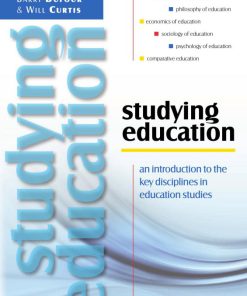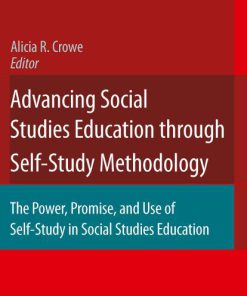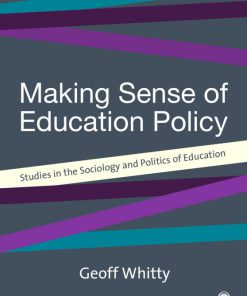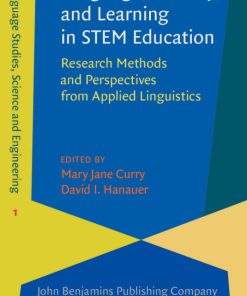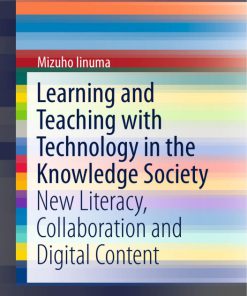Literacy and Education Understanding the New Literacy Studies in the Classroom 1st edition by Kate Pahl, Jennifer Rowsell ISBN 1412901146 978-1412901147
$50.00 Original price was: $50.00.$25.00Current price is: $25.00.
Authors:Dr Kate Pahl, Ms Jennifer Rowsell , Series:Education [385] , Author sort:Dr Kate Pahl, Ms Jennifer Rowsell , Languages:Languages:eng , Publisher:Sense Publishers
SKU: EB-23484
Category: eBook PDF
Tags: Education Understanding, Jennifer Rowsell, Kate Pahl, New Literacy, the Classroom
Literacy & Education Understanding the New Literacy Studies in the Classroom 1st edition by Kate Pahl, Jennifer Rowsell – Ebook PDF Instant Download/Delivery. 1412901146 978-1412901147
Full download Literacy & Education Understanding the New Literacy Studies in the Classroom 1st edition after payment

Product details:
ISBN 10: 1412901146
ISBN 13: 978-1412901147
Author: Kate Pahl, Jennifer Rowsell
Literacy and Education represents a comprehensive look at how to rethink, redefine, and redesign language in the classroom to meet contemporary needs.
Literacy & Education Understanding the New Literacy Studies in the Classroom 1st Table of contents:
1. Introduction: Reimagining Literacy in Education
- Defining literacy in the 21st century
- The historical development of literacy studies
- The shift from traditional to new literacy studies
- The impact of technology and media on literacy practices
- The role of literacy in the classroom and beyond
2. Theoretical Foundations of New Literacy Studies
- The rise of New Literacy Studies (NLS)
- Key concepts in New Literacy Studies: Literacy as social practice, multiple literacies, and discourse communities
- Theories of literacy development: Vygotsky, Lave & Wenger
- Literacy and identity: How literacy shapes individuals and communities
3. Literacy as Social Practice
- Literacy beyond the classroom: Contexts, communities, and cultures
- The relationship between literacy practices and social structures
- Multimodal literacy: Understanding the importance of visual, digital, and other forms of communication
- Literacy events and their significance in everyday life
- Bridging home and school literacy practices
4. New Literacies in a Digital Age
- Digital literacy: Understanding its role in the 21st century
- Online reading, writing, and communication
- Social media and literacy: The impact of digital tools on literacy practices
- Critical literacy in digital contexts
- The role of video, gaming, and other interactive forms of media in literacy
5. Multimodal Literacies in the Classroom
- Exploring multimodal texts: Visual, auditory, and spatial literacies
- Teaching with multimodal texts in the classroom
- The role of graphic novels, comics, and visual texts in literacy instruction
- Integrating film, music, and art in literacy education
- Developing critical thinking through multimodal analysis
6. The Role of the Teacher in New Literacy Education
- Shifting pedagogical approaches in the age of new literacies
- Teacher as facilitator: Supporting students in navigating complex literacy landscapes
- Incorporating new media and technologies into literacy instruction
- Encouraging critical literacy practices in the classroom
- Professional development for educators in the context of new literacies
7. Literacy, Power, and Identity
- The intersection of literacy and social inequality
- Literacy as a tool for empowerment or marginalization
- Race, gender, and class in literacy practices
- Disrupting dominant literacy practices and fostering inclusivity
- Understanding the politics of literacy and language
8. Critical Literacy and Social Justice
- What is critical literacy? Key concepts and practices
- Using literacy to challenge and critique societal norms
- Empowering students to engage with texts in transformative ways
- Literacy as a tool for social change
- Case studies of critical literacy in action in the classroom
9. Assessment and New Literacies
- Rethinking assessment in the context of new literacies
- Traditional vs. alternative literacy assessments
- Evaluating digital, multimodal, and critical literacy
- Formative and summative assessments in literacy education
- Using portfolios, self-assessments, and peer feedback
10. Literacy for the Future: Preparing Students for the Evolving World
- The future of literacy education in a changing world
- Preparing students for global citizenship through literacy
- Literacy as a lifelong skill: Beyond formal education
- Challenges and opportunities in literacy education
- The importance of fostering literacy for diverse and inclusive communities
11. Conclusion: Re-visioning Literacy Education for the 21st Century
- Summary of the key concepts and themes of the book
- Looking ahead: The role of educators in shaping literacy education
- The continuing evolution of literacy and its impact on learning
- The importance of embracing new literacies for future generations
People also search for Literacy & Education Understanding the New Literacy Studies in the Classroom 1st:
promoting multilingual education literacy for mutual understanding and peace
literacy and deaf education toward a global understanding
what does literacy mean in education
why is literacy important in education
what is education literacy
You may also like…
Sale!
Sale!
Sale!
Sale!
Sale!
Sale!
Sale!
Sale!
Sale!






